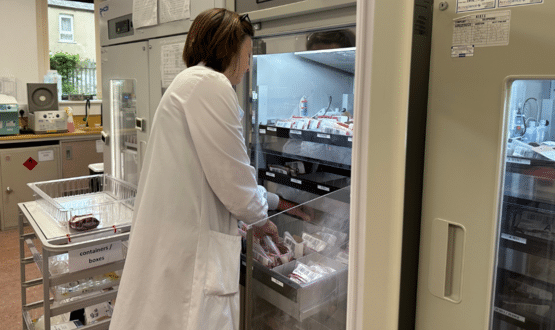Industry news round up in brief
- 21 May 2021

The latest Digital Health industry news round-up features news Chelsea and Westminster has deployed an app to help patients navigate the hospital.
Chelsea and Westminster team up with BuzzStreets
BuzzStreets and Chelsea and Westminster Hospital NHS Foundation Trust are launching a unique indoor way-finder for hospitals to help patients and their families navigate their way around more easily.
It is also aimed to reduce staff time spent giving directions, help ensure patients arrive on time for appointments, reduce stress, and minimise traffic in the corridors.
The new app is part of the CW Innovation programme – a joint initiative between Chelsea and Westminster Hospital NHS Foundation Trust and its charity CW+. After a successful trial, the new system, created by BuzzStreets, allows visitors to Chelsea & Westminster Hospital in London to navigate their way from outside all the way to the specific location they need, whether that’s a bed on a ward, a consulting room, the café, or the pharmacy.
The app includes points of interest such as offices, cafeterias and, uniquely, more information about the trust’s collection of over 2,000 works of art and digital installations that transform the hospital environment for patients, families, volunteers and staff.
Vanessa Sloane, deputy chief nurse at the trust, said: “The pilot project has already shown that the app reduces frustration for staff and visitors alike. It helps reduce the anxiety of patients and visitors trying to find their way in the hospital, which previously required contact with multiple different staff.
“Overall, we’ve seen that the app helps save resources, improve patient outcomes, and enhances the entire hospital experience for patients and their families.”
Black Country Pathology Services teams up with CliniSys
Black Country Pathology Services has worked with CliniSys to create the ICE [Integrated Clinical Environment] Portal, a web-based application that makes it easy for care homes, or other community care settings, to be able to order lab based Covid-19 tests and see the results.
The pathology network has also drawn up plans with the company to continue development work on the ICE Portal, so it is ready for future health emergencies and can be used by other health and care services that need to order tests but can’t use existing networks and IT systems.
Manx Baker, programme manager, said: “When the pandemic arrived, it soon became apparent that pathology services across the country were not set-up to test people who are being cared for outside our family of NHS services.
“We called CliniSys and said ‘we need a website that care homes can use to order tests that sends the details straight into our systems’ – and we worked in partnership with them to create the ICE Portal.
“Although the pandemic is reducing in the UK, we will continue to develop the portal as an important piece of testing infrastructure that we just did not have before the crisis.
“We will also look to extend the portal so it can be used by other services that need to order tests from outside our normal systems, such as sexual health services and the primary care Vitamin D testing service.”
Black Country Pathology Services is a major pathology network that provides laboratory services to four large acute trusts from its base in Wolverhampton, where it has built a state-of-the-art hub for microbiology, histopathology and blood sciences.
The London Clinic turns to robots
The London Clinic plans to continue advancements in robotic surgery following the arrival of a da Vinci Xi Surgical System.
The clinical will have a particular focus on colorectal surgery, but plans to a centre of excellence in robotics in the heart of London’s Harley Street.
The independent hospital has successfully completed more than 10 colorectal surgeries using the da Vince robot, which allows for incredibly precise surgery, since its instalment in November 2020.
The Xi model is the latest iteration of the da Vinci series, providing surgeons with an advanced set of instruments as well as an “intelligent” patient table, to use in performing robotic-assisted, minimally invasive surgery. The surgeon guides the robot remotely using a nearby console.
Mr Manish Chand, a consultant colorectal surgeon and professor of surgery at the clinic, said: “For a number of reasons, the uptake of robotic surgery in certain fields has been slow within the private sector. Often, the robots have been limited to the field of urology; or there has been a lack of resources and training to perform robotic surgery.
“However, there are a great many benefits to robotic surgery, which we are keen on sharing with our patients.
“For each of the cases we have performed since the installation of the Xi, including complex cancers as referrals from other centres or technically challenging re-do surgery, our patients have found robotic surgery to be hugely satisfying and comfortable.
“They have experienced little pain post-operatively, and have been able to go home quickly and safely when compared to other forms of surgery.”
ADASS Yorkshire and Humber deploy HAS Technology
ADASS Yorkshire and Humber has become the association’s latest region to work with HAS Technology and implement its PAMMS solution across local authorities, after its proven success in the ADASS East region.
Working with the PAMMS team, councils in the ADASS Yorkshire and Humber region will be bringing together market intelligence, quality and financial data to be accessed in one place, in real-time.
Iain MacBeath, strategic director at Bradford Metropolitan Council, said: “Yorkshire and Humber was already looking at a regional approach to procuring PAMMS and benefitting from the development of reports and links to their own contract monitoring databases. We are now proceeding as a region with the majority of councils participating in the first stage.
“As a region we can design reports to respond to the assurance challenge and redesign our quality systems to respond to exceptions and triggers that these will throw up.
“It allows us to benchmark and reduce that variation in care quality across the region, helping us ensure all citizens can access high quality care. We can also work together on improvement initiatives identified by this intelligence reinforcing why developing one solution is better than developing fifteen.”
Ben Chance, head of PAMMS, said: “Our PAMMS solution empowers local authorities with information at a local, regional and sub regional level with secure role-based reporting bringing together disparate data and intelligence, something we hope will benefit councils within Yorkshire and Humber to deliver great outcomes, in the same way it has benefitted their colleagues in other regions.”
Bradford and Airedale NHS select Lyngsoe X-Tracking
Airedale NHS Foundation Trust and Bradford Teaching Hospitals NHS Foundation Trust have awarded a 4 year contract to Lyngsoe Systems to supply its X-Tracking real-time location tracking solution.
The system is an enterprise level asset tracking solution that supports GS1 Standards and provides a comprehensive, automatic data capture platform using a combination of data capture technologies including radio frequency identification and barcodes.
Both trusts will be using the solution to track their fleets of medical devices. Each medical device will be labelled with a unique GS1 asset label that contains an embedded passive radio frequency tag. A selection of passive radio frequency readers will be placed at key areas around the hospital to automatically detect and record the movement of tagged medical devices.
Alongside that, mobile and hand portable passive radio frequency readers can be used to more accurately capture medical device details and their associated locations.
Aubrey Sitch, Scan4Safety programme manager for both trusts, said: “Prior to the pandemic, finding equipment across busy hospital sites presented genuine challenges. Covid added to that difficulty with increased demand for equipment and reduced access to the wards.
“Working with Lyngsoe Systems to deploy a solution that tracks an initial 38,000 assets will ensure more staff capacity and expertise is available to provide essential care.”




